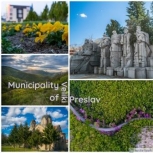
Véliki Preslav
The territory of the municipality is characterized by diverse terrain and markedly clean environment. It has significant forests, rich biodiversity, favorable soil and climatic conditions, good conditions to produce environmentally friendly products. There are no serious industrial sources of pollution. The population is provided with access to education, healthcare, sports and a wide range of social services. All settlements on the territory of the municipality are covered in the system for organized garbage collection and garbage removal. Initiatives are being implemented for separate collection of packages waste, glass, textiles, bulky, hazardous and construction waste.
In the past the city was the capital of Bulgaria (893-927). During the same period the Bulgarian alphabet "Cyrillic" was created here - the third official alphabet in the European Union, used by over 300 million people worldwide. To this day, a rich cultural and historical heritage has been preserved - values, symbols of antiquity and the medieval Bulgarian state, which represent a significant potential for the development of cultural and historical tourism.
Despite the glorious past, the modern city and municipality face serious challenges, such as underdeveloped economy, negative demographic trends, unsatisfactory state of infrastructure, low energy efficiency of the building stock, low qualification of the workforce, lack of sufficient financial resources to implement large-scale municipal projects, etc.
As part of a package of measures to improve administrative capacity and enhance the integration of sustainable development principles into local policies, the municipal leadership has focused its efforts on finding opportunities to join thematic partner networks to learn from shared experiences and good practices. Participation in the Global Goals for Cities pilot network, funded by the URABCT III operational program, is an opportunity to achieve both - on the one hand - acquiring the skills of local stakeholders to work in transnational networks, on the other, to develop a local strategic document based entirely on sustainable development - the 17 UN Sustainable Development Goals.
